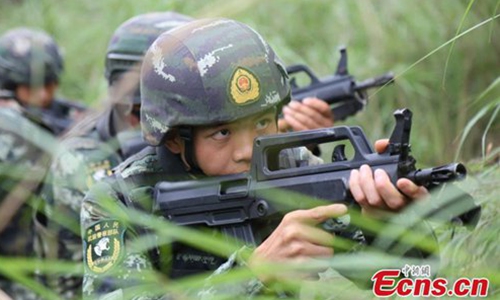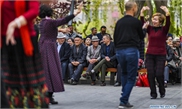
Photo:Xinhua
Saturday marks three consecutive years of peace and stability for Northwest China's Xinjiang Uyghur Autonomous Region since the last terror attack struck Hotan Prefecture's Moyu county on December 28, 2016.
Residents of all ethnic groups hailed the hard-earned stability and praised Xinjiang for emerging as the safest region in China. Experts noted that overseas separatists and terrorists would persist to infiltrate China, therefore de-radicalization work in Xinjiang would not end, and targeted education will be offered by residential communities and families.
In the afternoon hours of December 28, 2016, four terrorists rammed into a courtyard at the Moyu county government and hacked employees, besides lobbing homemade bombs. One official and a security worker were killed and three others injured in the attack. The terrorists were shot dead during the attack, Xinhua News Agency reported.
China's national broadcaster CGTN aired two documentaries on Xinjiang's anti-terrorism efforts in early December, and broadcast rare footage of the attacks in Xinjiang for the first time.
Analysts said the videos only captured a fragment the anti-terrorism situation in Xinjiang from three years ago. Considering public reaction, Chinese authorities only released footage of a few terrorism-related incidents.
Incomplete statistics show that from 1990 to the end of 2016, separatist, terrorist, and extremist forces launched thousands of terrorist attacks in Xinjiang, killing large numbers of innocent people and hundreds of police officers, besides inflicting immeasurable damage to property, according to a white paper on Xinjiang's anti-terrorism work released by the State Council Information Office in March.

Photo: China News Service
Healing the wounds
Many lives have been lost due to terrorist attacks in Xinjiang, along with economic losses and mental trauma perpetrated against members of all ethnic groups in Xinjiang. Many residents shared their stories with the Global Times.
A resident from Urumqi surnamed Zhang said, "Whenever I see an unclaimed suitcase or a bag in public areas, I panic. I once called the police after spotting a bag left by someone in a corner in the subway station in Beijing. My friends from other regions in China thought I overreacted, but they did not witness as many terror attacks as I did."
Videos of terror attacks in Xinjiang corroborated Zhang's words, as terrorists indeed used suitcases laded with explosive devices and detonated them in public areas.
In a conversation with the Global Times, Yerkex, a woman from Urumqi recalled an incident from May 2014 when she had stopped by to buy breakfast at a morning market close to her home.
On May 22, 2014, five terrorists drove two SUVs through the fence of a morning market in Saybagh district, and after ramming into a crowd they detonated a bomb, which killed 39 and injured 94, according to a white paper released by the State Council Information Office in March.
In recent years, people from all ethnic groups in Xinjiang, including local officials, and governments have made great efforts in healing the pain inflicted by terrorism and vowed to combat terrorism, analysts said.

Armed police patrol the streets of Hotan, Xinjiang after holding an oath-taking rally where they pledged to fight terrorism and tighten security. Photo: ts.cn
According to incomplete data from CCTV, from 2013 to 2016, a total of 127 police officers in Xinjiang died in the line of duty against terrorism.
To counter terrorism and safeguard basic human rights, Xinjiang has implemented a series of safety measures over the past three years, Li Wei, a counter-terrorism expert at the China Institute of Contemporary International Relations in Beijing, told the Global Times.
In order to eradicate extremism, Xinjiang launched vocational education and training centers to help de-radicalize people and launched a five-year campaign to fight terrorists in May 2014, Li noted.
One year after the campaign, 181 terrorist and violent groups were busted. To ramp up efforts, on February 16, 2017, the region also held an oath-taking ceremony in Hotan which was attended by a few hundred police personnel and special police officers, ts.com reported.
Financial support from the central government, including a number of municipalities and provinces, was advanced to Xinjiang to help with the pace of economic development, improve livelihoods and reduce poverty, said Li.
With the aim of strengthening ethnic unity and facilitating poverty alleviation, in 2016, Xinjiang started an activity to encourage government officials to undertake activities among different ethnic groups. Two years later, over 1.12 million officials and government employees had paired 1.69 million local households as "relatives," xinhuanet.com reported.
Officials stationed in villages are working hard and many of them even do not rest even during the holidays and festivals. Their efforts have paid off as their work is being recognized by residents, and poverty alleviation has been boosted, some Xinjiang officials reached by the Global Times said.
Since 2014, more than 2,385,000 people in Xinjiang have been lifted out of poverty and the poverty incidence has dropped to 6.51 percent in 2019 from 22.48 percent in 2014, according to a release from the Xinjiang regional government in December.
As a region that once endured frequent terror attacks, Xinjiang has implemented more stringent security checks. Some residents told the Global Times they once thought the security checks brought inconvenience to their daily life but gradually understood that it was done ensure public safety.
The efforts have paid off as there hasn't been a violent attack in Xinjiang for three consecutive years, local residents are enjoying the safest period in Xinjiang's history and local economies have benefitted from the stability, analysts said.
Residents and tourists visited Xinjiang said in online forums that Xinjiang is the safest place in China. A resident from Aksu Prefecture told the Global Times he usually tells relatives in other provinces that they can even walk undaunted in the streets of Xinjiang with a bag full of cash.
Peace and stability also benefited Xinjiang's tourism sector. Before 2006, Xinjiang saw fewer tourists in the winter season, but in 2018, the region received more than 30 million trips in winter. From January to October in 2019, Xinjiang received more than 201.92 million trips, a 42.62 percent increase than that of last year, xinhuanet.com reported.
The Global Times reporters witnessed young people of different ethnicities dancing happily at around 1:30 am in a club in Baicheng county, Aksu to celebrate a traditional festival.
An employee told the Global Times people did not hang out this late at night when terror attacks were frequent in the area. With the public safety greatly improved in these years, residents enjoy their night lives.

Local farmers surrounded by Apples in Aksu, Northwest China's Xinjiang Uyghur Autonomous Region File photo: VCG
Staying alert
"Despite the good situation in Xinjiang, we should still be cautious about the consistent infiltration of overseas terrorist and separatist groups, especially after they have colluded with anti-China forces," Li said.
Li noted de-radicalization work in Xinjiang should not end and after all the trainees graduate from the training centers and return, more efforts should be made by residential communities and families to ensure they don't sway from the right path of life.
"Even though the US or Western media attack China's Xinjiang policies for political purposes, they cannot change the improving situation and life of people in Xinjiang. With our efforts, Xinjiang did not slip into turmoil like many places in the Middle East. This fits our people and country's interests. We will continue to make Xinjiang prosperous," Li said.




